Yoweri Museveni - Uganda's president profiled
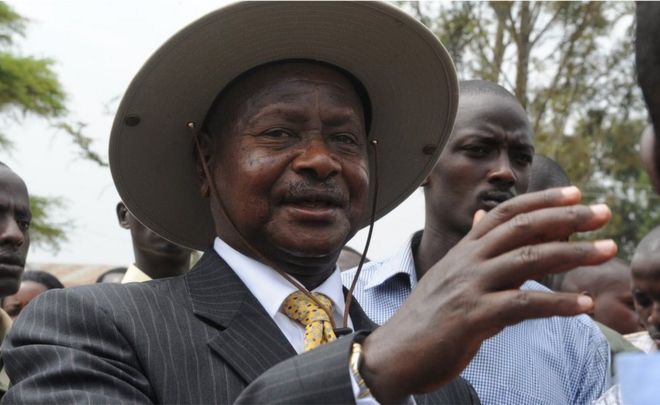 GETTY IMAGES
GETTY IMAGES
Uganda's President Yoweri Museveni is a driven man, who loves wearing big hats.
Having been involved in toppling two presidents, as well as running the country for 30 years, he believes he is the only person to lead Uganda.
He is running for fifth term in office, something he justified in a rally in January by saying he needs to finish the job off.
"This old man who has saved the country, how do you want him to go?" he said.
"How can I go out of a banana plantation I have planted that has started bearing fruits?"
Age-old question
The exact age of "this old man" is up for debate.
The government says he is 71 but the opposition has said he is lying about this and is actually five years older.
This would make him too old to run for this election as the country's age limit is 75.
According to Uganda's Daily Monitor newspaper, the president says he does not know the exact date of his birth.
"My parents were illiterate and so did not know the date," it quotes him as saying in his autobiography Sowing the Mustard Seed, published in 1997.
Nevertheless, he has insisted to the press that he is in excellent health, "save for occasional malaria attacks, coughs or mild allergic reactions in the nose".
He went on to say in 2015 that "even today, there are hardly any physical exertions that I cannot undertake except squatting, which I find a bit uncomfortable these days".
On family
In his last term in office a controversial anti-homosexuality law thrust him into the international spotlight.

Museveni's dates with history:
- 1944: Official date of birth
- 1979: Helps oust Idi Amin
- 1986: Seizes power
- 1996: Sends troops into DR Congo
- 2001: Promises to stand down at next election
- 2005: Told by Sir Bob Geldof: "Your time is up"
- 2011: Wins fourth term in office
- 2016 runs for his fifth term in office

In 2014 Mr Museveni signed into law an anti-homosexuality bill proposed by a member of his National Resistance Movement.
It was thrown out a few months later on a technicality but while it was being debated in 2012 he revealed a rare insight into his family life.
"I have been married to my wife for 39 years, but I have never kissed her in public and in my house before the children," he said.
Seeking Kony
Another issue in Uganda which gained international attention was his fight against the rebel Lord's Resistance Army (LRA), notorious for kidnapping children and forcing them to become sex slaves or fighters.
In 2004 Mr Museveni confidently assured the BBC's Andrew Harding that the war against the LRA would be over in months.
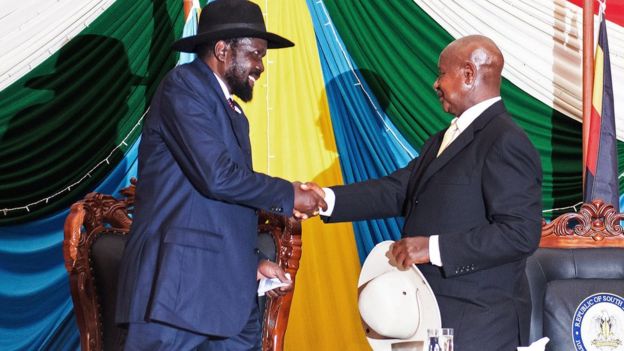 AFP
AFP
It didn't quite work out like that. The conflict was nudged into neighbouring countries.
Then in 2012 it was nudged again into the gossip columns after celebrities backed a campaign to find LRA leader Joseph Kony once and for all.
The campaign was highly critical of Mr Museveni's efforts to find Mr Kony.
Staying young
The year before he tried to reinvent himself - especially with the youth in mind - and released his own rap.
It was called Do You Want Another Rap? but it really meant I Want Another Term.
His wish was granted, beating for a third time his main rival, Kizza Besigye, with 68% of the vote.
In 2001, he had said he would stand down at the next election and one of his tasks would be to choose a successor.
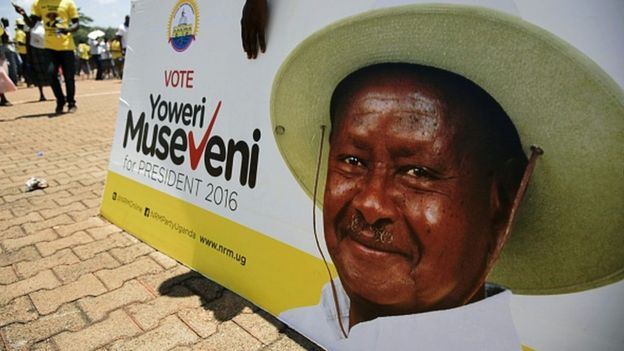 GETTY IMAGES
GETTY IMAGES
But he obviously changed his mind and had the constitution amended to let him run for a third term in office in 2006.
That was the first time he allowed multi-party elections but the outcome was the same.
What has changed was the attitude of Western donors.
'Your time is up'
Mr Museveni was once feted as someone the West could do business with - one of the new generation of Africa leaders to replace the "Big Men" - the independence leaders who clung to power for as long as they possibly could.
But his critics say Mr Museveni has become just another "Big Man".
Ahead of the 2006 vote, Mr Besigye was accused of treason and rape - charges he maintains were politically motivated and which the courts have since dismissed.
Since the 2011 polls, he has been arrested four times, often in a brutal manner, for involvement in "walk-to-work" protests over the rises in the cost of food and fuel.
Mr Museveni's government accuses Mr Besigye, who once served as the president's physician when they were fighting Milton Obote's government in the early 1980s, of trying to organise a popular uprising.
The UK cut some of its aid in response to concerns about the future of Ugandan democracy.
The mood of the donors was captured by rock-star-turned-campaigner Sir Bob Geldof's outburst at the 2005 launch of the African Commission report: "Get a grip Museveni. Your time is up, go away," he said.
But oil was then discovered in Uganda, prompting Mr Museveni to say Uganda would soon be able to do without the pesky donors.
He told the BBC's Focus on Africa programme in 2011 that one of his goals was to "liberate ourselves from foreign control".
Guerrilla origins
Yoweri Kaguta Museveni was born in 1944 into a family of cattle keepers in Ankole, western Uganda.
His name was taken from the Abasuveni - the Ugandan servicemen in the Seventh Regiment of the King's African Rifles.
He says in his biography - which tells much about his political development and almost nothing about his personal life - that he became politically aware while still a secondary school student.
He later went to the University of Dar es Salaam and studied Economics and Political Science, and while there forged alliances with other politically active "revolutionaries" from around the region.
Mr Museveni's political career took off in the 1970s, after a coup by the notorious Idi Amin.
He helped form the Front for National Salvation which was one of the rebel groups that, backed by Tanzania, ousted Amin.
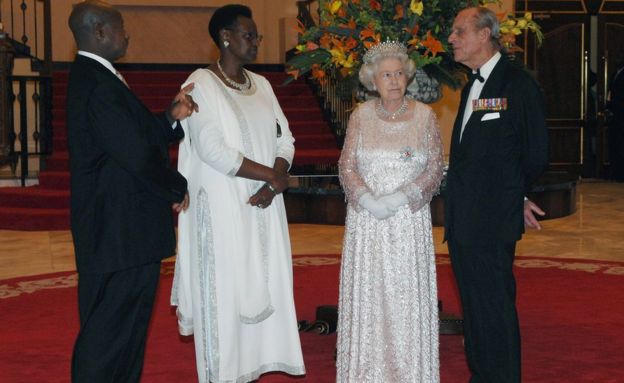 AFP
AFP
Mr Museveni served as minister in the new government but then claimed that the 1980 elections were rigged.
On 6 February 1981, Mr Museveni went into the bush, and launched a guerrilla struggle against Mr Obote's government based in the swamps of central Uganda.
His National Resistance Army eventually took power in January 1986 and introduced the Movement system of politics - described as a broad-based, alternate system of democracy in which people compete for political office on individual merit.
Mr Museveni argued that political party activity split underdeveloped countries like Uganda along ethnic and religious lines.
Over the next 10 years, Mr Museveni became a darling of the West.
Uganda's economy began to grow steadily and saw annual average annual growth of over 5%. Its commitment to tackle poverty was hailed.
Primary school education enrolment doubled, HIV levels dropped because of an impressive anti-Aids campaign spearheaded by the president.
'New battles'
That image, however, soon began to crumble when Uganda and Rwanda invaded neighbouring Democratic Republic of Congo in support of rebels fighting to overthrow the government.
Troops from Uganda and Rwanda fought each other in DR Congo, with Congolese civilians paying the price. Both armies were accused of looting DR Congo's rich mineral resources.
More on Uganda's election:

- Old guard tries new tactics
- Issues, candidates and the poll
- Profile: Opposition leader Kizza Besigye
- Profile: Independent candidate Amama Mbabazi
Uganda's involvement in the war damaged Mr Museveni's reputation at home and abroad. It also took up much of his time.
During this period there were increasing complaints that Mr Museveni was growing more hard-line and relying increasingly on a kitchen cabinet of hard-line supporters.
His 2001 presidential election victory was marred by an increase in state-sponsored violence - and Mr Besigye, again his main rival, fled the country claiming his life was in danger.
Critics say Mr Museveni has become less tolerant of opposing views, and his language has become more combative.
The force of the president's convictions is both his strength, as it enables him to get things done, and his weakness, as it has led him to find it increasingly hard to brook opposition.
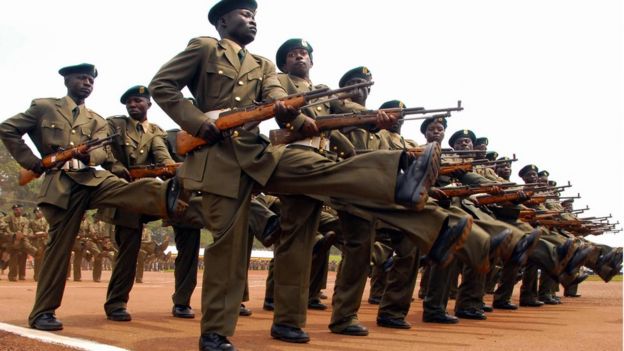 AFP
AFP
Corruption remains a serious problem in Uganda and Mr Museveni has faced criticism for not taking a stronger line.
The Global Fund to Fight Aids, Tuberculosis and Malaria has suspended some grants to Uganda, citing alleged financial mismanagement.
Some now criticise his Aids policy, saying that under the influence of US evangelical Christians, condoms are no longer being promoted.
Mr Museveni has officially retired from the army to fight "new battles".
He told the BBC in 2011 that he wanted to leave two things as his legacy:
- The socio-economic transformation of Uganda - turning the country into a first world country
- An East African Federation.
He has been accused of having ambitions to be the first leader of a united East Africa and grooming his son to succeed him in a kind of Ugandan monarchy.
While these could be dismissed as speculation, it is clear that Mr Museveni thinks that 30 years hasn't been enough to make his mark.
No comments:
Post a Comment